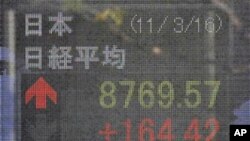Stock markets in the United States, Asia and Europe plunged sharply on Tuesday as investors dumped stocks over worries about the nuclear crisis in Japan. The Japanese government is trying to reassure markets that Japan is open for business - injecting hundreds of billions into money markets.
Even as the world reaches out to aid the quake and tsunami devastated nation of Japan, global financial markets are doing the opposite --dumping stock holdings in businesses directly or indirectly affected by the disaster.
Japan is one of the world’s largest economies because it manufactures products used around the world.
As a result, Japan expert Nicholas Szechenyi at the Center for Strategic and International Studies tells says any disruption in Japan tends to have a proportional impact in other parts of the world.
"Japan’s economy is very much integrated with the Asia Pacific region in terms of exports and manufacturing and also with the global supply chain. When you talk about the globalization of the international economy, it’s about the production of components of imports and exports,” Szechenyi said. “It’s a very elaborate system and any delays in Japan as a result of this catastrophe can have ripple effects on the international economy."
The ripples have had a depressing effect on global stocks, sending oil prices lower and weakening shares in companies with substantial business interests in Japan.
Masaaki Kanno at JP Morgan Securities calls it a dangerous over-reaction fueled by panic-stricken investors. "And if this vicious cycle starts then actually people’s risk appetite wanes furthermore and nobody knows how far the Nikkei should fall," Kanno states.
The sell-off decimated major indexes in Japan.
Tokyo's benchmark Nikkei plunged more than 10 percent as investors reacted to the possibility of a Japanese nuclear catastrophe.
Traders in Europe and the United States also dumped stocks on Tuesday, although in some cases the markets recovered some of their losses.
The Japanese government has injected nearly $250 billion into its financial system to reassure markets, but analysts says the full extent of the quake’s damage in the world's third largest economy will not be known for some time.




